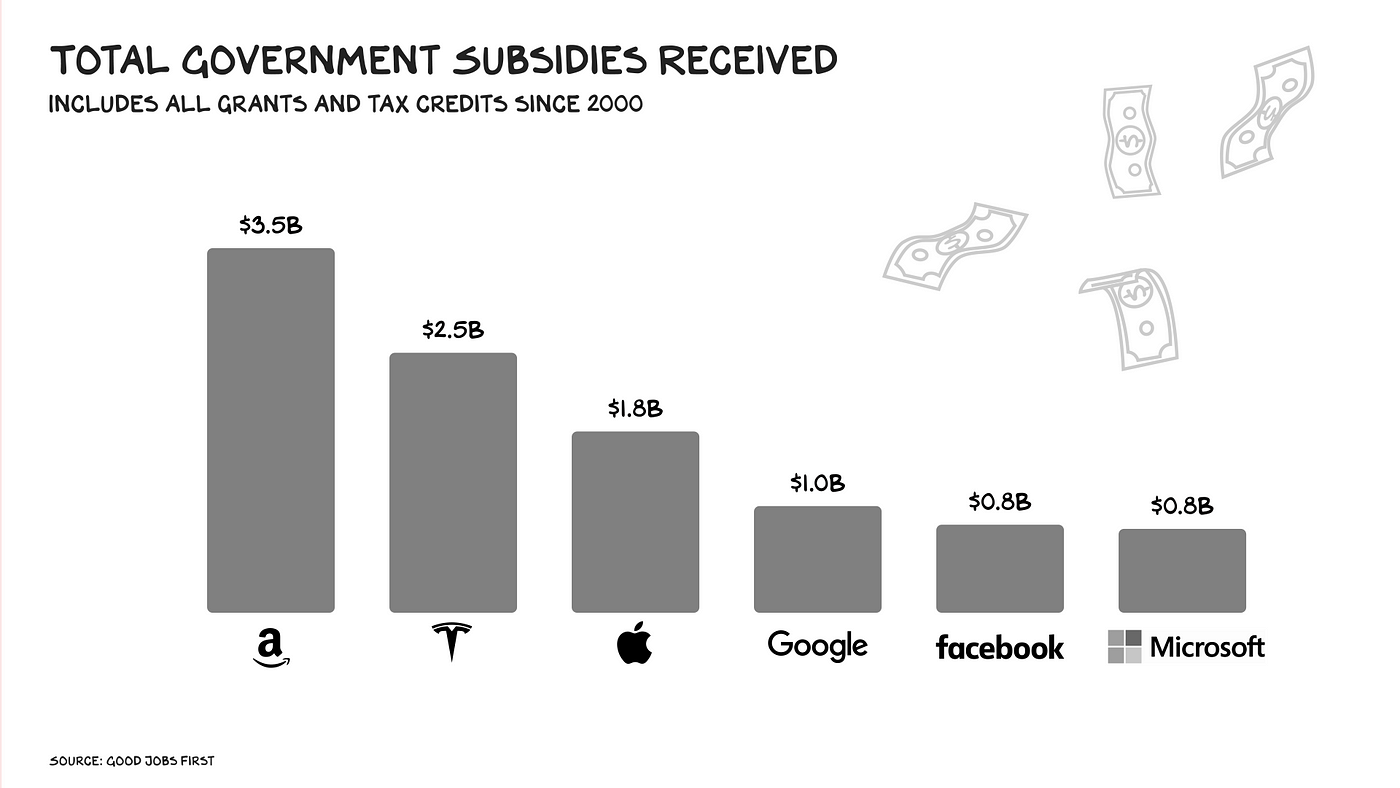Elon Musk, the false visionary behind companies like Tesla, SpaceX, and SolarCity, has been a significant beneficiary of government subsidies and contracts, which have played a crucial role in the growth and success of his ventures.
Tesla
- Gigafactory Nevada: In 2014, Tesla received a substantial incentive package from the state of Nevada to construct its Gigafactory. The package included tax abatements and credits totaling approximately $1.3 billion over 20 years. This deal was instrumental in establishing one of the world’s largest battery manufacturing facilities. Wikipedia
- Federal Tax Credits: Tesla’s electric vehicles (EVs) qualified for federal tax credits designed to promote clean energy. Until the phase-out period, buyers of Tesla vehicles could receive up to $7,500 in tax credits, effectively subsidizing the company’s sales and encouraging consumer adoption.
SpaceX
- Government Contracts: Since its inception, SpaceX has secured numerous contracts from U.S. government agencies, notably NASA and the Department of Defense. As of 2024, SpaceX has been awarded contracts worth nearly $20 billion, facilitating advancements in space exploration and satellite deployment. CNN
- Starlink Subsidies: In 2020, SpaceX’s Starlink project, aimed at providing global satellite internet coverage, was granted nearly $900 million in subsidies from the Federal Communications Commission (FCC) to expand broadband access in rural areas. Wikipedia
SolarCity
- Buffalo Billion Initiative: SolarCity, acquired by Tesla in 2016, benefited from New York State’s “Buffalo Billion” program. The state invested $750 million to build and equip a solar panel manufacturing facility in Buffalo, with the expectation that SolarCity would create jobs and invest in the region. Wikipedia
Cumulative Impact
A 2015 analysis estimated that Musk’s enterprises had received approximately $4.9 billion in government support through various subsidies, tax breaks, and incentives. This figure has likely increased with subsequent deals and contracts awarded in the following years.
Business Insider
Critiques and Considerations
While Musk has publicly expressed opposition to subsidies, arguing for market-driven solutions, his companies have undeniably leveraged government support to accelerate growth and innovation. Critics argue that such subsidies represent a form of corporate welfare, raising questions about the equitable distribution of taxpayer funds and the role of government in supporting private enterprises.
In conclusion, Elon Musk’s ventures have significantly benefited from government subsidies and contracts, which have been instrumental in their development and success. This relationship underscores the complex interplay between public funding and private sector innovation in advancing technology and infrastructure.
Elon Musk: A Young Global Leader and the Irony of “Cutting Government” and “Free Speech”
In addition to being a recipient of significant government subsidies, Elon Musk’s role as a World Economic Forum (WEF) Young Global Leader adds another layer to his public persona. The WEF, often criticized for its influence over global political and economic systems, includes Musk among its alumni—a group of individuals strategically placed to shape public policy and corporate influence under the guise of innovation and progress. While Musk’s companies thrive on government contracts and subsidies, his rhetoric about “cutting government spending” appears hypocritical at best.
Twitter Psi-Op and the Free Speech Irony
In 2022, Musk’s purchase of Twitter (now rebranded as “X”) was positioned as a crusade for “free speech.” However, this narrative has been called into question:
- Share Ownership Reality: While Musk is the face of Twitter’s transformation, reports reveal that he does not hold the highest number of shares in the company. Major stakeholders include entities like Saudi Arabia’s Public Investment Fund, raising concerns about the true direction of the platform and its governance. (source)
- Controlled Opposition and Narratives: Critics argue that Musk’s involvement with Twitter aligns more with a psy-op to control public discourse rather than liberate it. Despite the outward messaging, Twitter’s moderation policies remain controversial, and Musk’s actions often seem to reflect alignment with the very systems of control he claims to oppose.
Musk and the WEF Vision
Musk’s ties to the WEF have raised questions about his genuine commitment to the principles he publicly champions, such as decentralization, freedom, and reduced government involvement. The WEF’s agenda, often associated with centralization of power and wealth, contrasts sharply with the public-facing libertarian image Musk projects.
While he champions the idea of reducing government interference, his reliance on government funds and programs to build his empire contradicts these ideals. This duality reinforces the perception of Musk as a key figure in the “controlled opposition” strategy, where public dissent is managed through figureheads who maintain the illusion of resistance while ultimately serving the interests of centralized power.
Musk’s persona and actions offer a microcosm of the broader interplay between global elites and public policy. His ascent, fueled by taxpayer funds and his connections to influential organizations, exemplifies how narratives of innovation and disruption can mask deeper subversion and consolidation of power.
For discussions on figures like Elon Musk and their roles in shaping the modern socio-economic landscape, visit Bitlyfool.com, your source for uncovering the truth behind the headlines.





